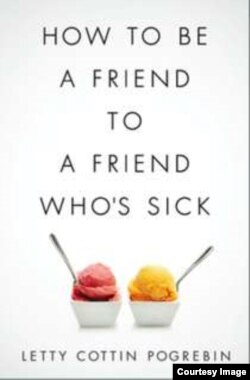NEW YORK —
A few years ago, after Letty Cottin Pogrebin, a founding editor of Ms. magazine, was diagnosed with breast cancer, she was struck by how difficult it was for some of her friends to talk about her illness in frank and supportive ways.
She began asking other cancer patients how their friendships had changed since their diagnoses, and a timely book idea was born. She titled it “How to Be a Friend to a Friend Who’s Sick.”
“It is really about how to relate to somebody who is in extremis, who is suffering, who makes you feel awkward because you have to face your own vulnerability and your own mortality and people are not good at it naturally," Pogrebin said. "It does not come naturally so they really pause, they blunder, they cannot find the right words.”
Pogrebin found that fear is at the bottom of many communications problems. Some people feel so uncomfortable in the presence of a sick person they do not want to see him or her at all.
Rhonda Waithe says that is how her brother felt when her son Jody was born with a grave disease and could not leave the hospital for nearly a year.
“He was like ‘I do not know how to act. I would not know how to be around these people,’" Waithe said. "And I would say to him ‘Just be yourself.' Because this is what they want, for you to just be you.”
Pogrebin also that found some people try a little too hard to be “nice.”
“And that there is really a whole misperception of what it is to be nice to a sick person," she said. "Sometimes the nicest thing you can do is simply treat them normally. The luxury of the normal. It is the miracle of the ordinary that I sought. I did not want to feel like ‘Cancer Girl.’”
Pogrebin says be mindful of what might actually help the loved one feel better, not what you think the “proper” thing to say or do is.
“It is very tempting to feel good about yourself when you are in a tough situation like that. ‘I called when I heard. I did the right thing.’ ‘I sent a bouquet of flowers. I did the right thing.’ I said, ‘you will get past this’ or ‘I am sure it is going to be OK.’ All those bromides we've heard people say for a million years," she said. "But you do not know on the other end if that is what is really needed, and if that is what is really wanted.”
Often, what is needed is practical hands-on help. That's what Nicole Brown craved when her late father became bedridden.
“We needed people to actually come and help us, be there for us," Brown said. "Bring some food. Help give him a bath.”
Pogrebin adds that simple courtesy often is the best policy.
“I know somebody told me that her friend said 'It is too cold in here' and went rummaging in her drawers for a sweater for her. Which is a very nice impulse," she said. "But she did not want her friends in her drawers. So sometimes an act of kindness can be an act of invasion.”
Pogrebin says to let the loved one take the lead.
“If you are the friend, ask the sick person ‘What do you really want us to do during this period? Do you want me to offer or just come and take the initiative?'" she said. "'I will take the advice you give me right now and I will run with it for the rest of the period of time that we are in this together.’ It is the simple Golden Rule, when you get down to it.”
She began asking other cancer patients how their friendships had changed since their diagnoses, and a timely book idea was born. She titled it “How to Be a Friend to a Friend Who’s Sick.”
“It is really about how to relate to somebody who is in extremis, who is suffering, who makes you feel awkward because you have to face your own vulnerability and your own mortality and people are not good at it naturally," Pogrebin said. "It does not come naturally so they really pause, they blunder, they cannot find the right words.”
Pogrebin found that fear is at the bottom of many communications problems. Some people feel so uncomfortable in the presence of a sick person they do not want to see him or her at all.
Rhonda Waithe says that is how her brother felt when her son Jody was born with a grave disease and could not leave the hospital for nearly a year.
“He was like ‘I do not know how to act. I would not know how to be around these people,’" Waithe said. "And I would say to him ‘Just be yourself.' Because this is what they want, for you to just be you.”
Pogrebin also that found some people try a little too hard to be “nice.”
“And that there is really a whole misperception of what it is to be nice to a sick person," she said. "Sometimes the nicest thing you can do is simply treat them normally. The luxury of the normal. It is the miracle of the ordinary that I sought. I did not want to feel like ‘Cancer Girl.’”
Pogrebin says be mindful of what might actually help the loved one feel better, not what you think the “proper” thing to say or do is.
“It is very tempting to feel good about yourself when you are in a tough situation like that. ‘I called when I heard. I did the right thing.’ ‘I sent a bouquet of flowers. I did the right thing.’ I said, ‘you will get past this’ or ‘I am sure it is going to be OK.’ All those bromides we've heard people say for a million years," she said. "But you do not know on the other end if that is what is really needed, and if that is what is really wanted.”
Often, what is needed is practical hands-on help. That's what Nicole Brown craved when her late father became bedridden.
“We needed people to actually come and help us, be there for us," Brown said. "Bring some food. Help give him a bath.”
Pogrebin adds that simple courtesy often is the best policy.
“I know somebody told me that her friend said 'It is too cold in here' and went rummaging in her drawers for a sweater for her. Which is a very nice impulse," she said. "But she did not want her friends in her drawers. So sometimes an act of kindness can be an act of invasion.”
Pogrebin says to let the loved one take the lead.
“If you are the friend, ask the sick person ‘What do you really want us to do during this period? Do you want me to offer or just come and take the initiative?'" she said. "'I will take the advice you give me right now and I will run with it for the rest of the period of time that we are in this together.’ It is the simple Golden Rule, when you get down to it.”








